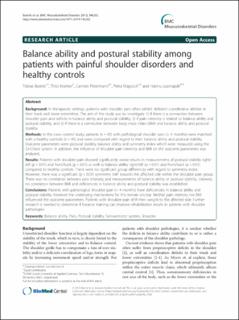Please use this identifier to cite or link to this item:
https://doi.org/10.21256/zhaw-1931Full metadata record
| DC Field | Value | Language |
|---|---|---|
| dc.contributor.author | Baierle, Tobias | - |
| dc.contributor.author | Kromer, Thilo | - |
| dc.contributor.author | Petermann, Carmen | - |
| dc.contributor.author | Magosch, Petra | - |
| dc.contributor.author | Luomajoki, Hannu | - |
| dc.date.accessioned | 2018-04-05T11:21:12Z | - |
| dc.date.available | 2018-04-05T11:21:12Z | - |
| dc.date.issued | 2013 | - |
| dc.identifier.issn | 1471-2474 | de_CH |
| dc.identifier.uri | https://digitalcollection.zhaw.ch/handle/11475/4849 | - |
| dc.description.abstract | Background: In therapeutic settings, patients with shoulder pain often exhibit deficient coordinative abilities in their trunk and lower extremities. The aim of the study was to investigate 1) if there is a connection between shoulder pain and deficits in balance ability and postural stability, 2) if pain intensity is related to balance ability and postural stability, and 3) if there is a connection between body mass index (BMI) and balance ability and postural stability. Methods: In this case-control study, patients (n = 40) with pathological shoulder pain (> 4 months) were matched with a healthy controls (n = 40) and were compared with regard to their balance ability and postural stability. Outcome parameters were postural stability, balance ability and symmetry index which were measured using the S3-Check system. In addition, the influence of shoulder pain intensity and BMI on the outcome parameters was analysed. Results: Patients with shoulder pain showed significantly worse results in measurements of postural stability right/left (p < 0.01) and front/back (p < 0.01) as well as balance ability right/left (p = 0.01) and front/back (p < 0.01) compared to healthy controls. There were no significant group differences with regard to symmetry index. However, there was a significant (p < 0.01) symmetry shift towards the affected side within the shoulder pain group. There was no correlation between pain intensity and measurements of balance ability or postural stability. Likewise, no correlation between BMI and deficiencies in balance ability and postural stability was established. Conclusions: Patients with pathological shoulder pain (> 4 months) have deficiencies in balance ability and postural stability; however the underlying mechanisms for this remain unclear. Neither pain intensity nor BMI influenced the outcome parameters. Patients with shoulder pain shift their weight to the affected side. Further research is needed to determine if balance training can improve rehabilitation results in patients with shoulder pathologies. | de_CH |
| dc.language.iso | en | de_CH |
| dc.publisher | BioMed Central | de_CH |
| dc.relation.ispartof | BMC Musculoskeletal Disorders | de_CH |
| dc.rights | https://creativecommons.org/licenses/by/2.0/ | de_CH |
| dc.subject | Balance ability | de_CH |
| dc.subject | Pain | de_CH |
| dc.subject | Postural stability | de_CH |
| dc.subject | Sensorimotor system | de_CH |
| dc.subject | Shoulder | de_CH |
| dc.subject.ddc | 617.5: Orthopädische Chirurgie | de_CH |
| dc.title | Balance ability and postural stability among patients with painful shoulder disorders and healthy controls | de_CH |
| dc.type | Beitrag in wissenschaftlicher Zeitschrift | de_CH |
| dcterms.type | Text | de_CH |
| zhaw.departement | Gesundheit | de_CH |
| dc.identifier.doi | 10.21256/zhaw-1931 | - |
| dc.identifier.doi | 10.1186/1471-2474-14-282 | de_CH |
| zhaw.funding.eu | No | de_CH |
| zhaw.issue | 282 | de_CH |
| zhaw.originated.zhaw | Yes | de_CH |
| zhaw.publication.status | publishedVersion | de_CH |
| zhaw.volume | 14 | de_CH |
| zhaw.publication.review | Peer review (Publikation) | de_CH |
| Appears in collections: | Publikationen Gesundheit | |
Files in This Item:
| File | Description | Size | Format | |
|---|---|---|---|---|
| 2013_Baierle_Balance ability_BMC Musculoskeletal Disorders.pdf | 597.5 kB | Adobe PDF |  View/Open |
Show simple item record
Baierle, T., Kromer, T., Petermann, C., Magosch, P., & Luomajoki, H. (2013). Balance ability and postural stability among patients with painful shoulder disorders and healthy controls. BMC Musculoskeletal Disorders, 14(282). https://doi.org/10.21256/zhaw-1931
Baierle, T. et al. (2013) ‘Balance ability and postural stability among patients with painful shoulder disorders and healthy controls’, BMC Musculoskeletal Disorders, 14(282). Available at: https://doi.org/10.21256/zhaw-1931.
T. Baierle, T. Kromer, C. Petermann, P. Magosch, and H. Luomajoki, “Balance ability and postural stability among patients with painful shoulder disorders and healthy controls,” BMC Musculoskeletal Disorders, vol. 14, no. 282, 2013, doi: 10.21256/zhaw-1931.
BAIERLE, Tobias, Thilo KROMER, Carmen PETERMANN, Petra MAGOSCH und Hannu LUOMAJOKI, 2013. Balance ability and postural stability among patients with painful shoulder disorders and healthy controls. BMC Musculoskeletal Disorders. 2013. Bd. 14, Nr. 282. DOI 10.21256/zhaw-1931
Baierle, Tobias, Thilo Kromer, Carmen Petermann, Petra Magosch, and Hannu Luomajoki. 2013. “Balance Ability and Postural Stability among Patients with Painful Shoulder Disorders and Healthy Controls.” BMC Musculoskeletal Disorders 14 (282). https://doi.org/10.21256/zhaw-1931.
Baierle, Tobias, et al. “Balance Ability and Postural Stability among Patients with Painful Shoulder Disorders and Healthy Controls.” BMC Musculoskeletal Disorders, vol. 14, no. 282, 2013, https://doi.org/10.21256/zhaw-1931.
Items in DSpace are protected by copyright, with all rights reserved, unless otherwise indicated.